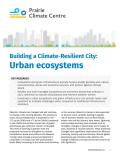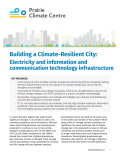
Alberta’s climate is changing: temperatures are rising, particularly in the winter; heat waves have become more frequent; and the growing season has become longer. These trends are expected to continue into the future. Alberta’s mean annual temperature could rise by 2.0°C by the 2030s and 4.0°C by the 2060s (compared to the 1990s), depending on future rates of greenhouse gas emissions. At the same time, precipitation levels and patterns will change. Total average annual precipitation is projected to rise, increasing more in the winter and declining in the summer.
Alberta’s climate is also expected to become more variable, leading to less predictable weather and greater risk of extreme events such as floods, severe rainstorms, heat waves and droughts. While reducing global greenhouse gas emissions would lessen the severity of the climate change experienced by Alberta, significant modification will still occur in the coming decades.




